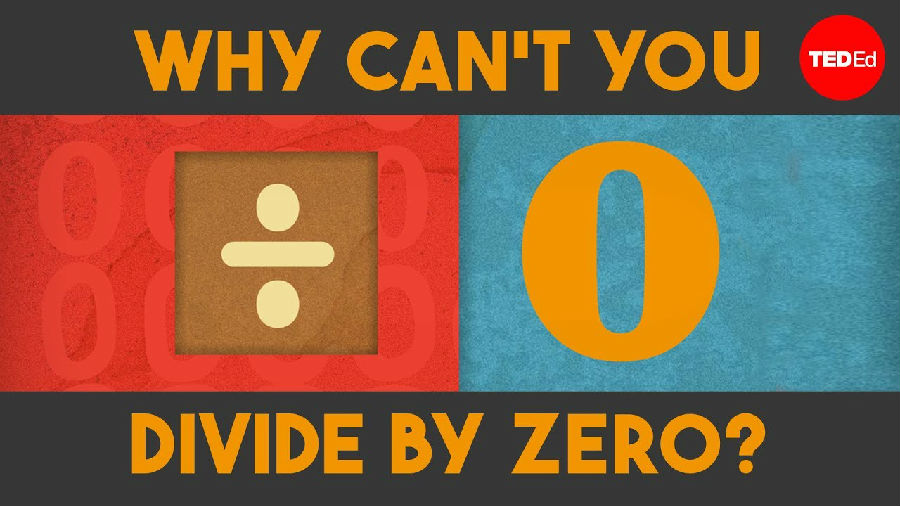(单词翻译:单击)
In the world of math, many strange results are possible when we change the rules.
在数学世界里,当我们改变规则时,有可能产生许多奇怪的结果。
But there's one rule that most of us have been warned not to break: don't divide by zero.
但其中有一条规则,我们很多人都被告诫说不要去打破它:不要把零当除数去除。
How can the simple combination of an everyday number and a basic operation cause such problems?
为什么将这一日常数字与基本运算结合起来会导致问题呢?
Normally, dividing by smaller and smaller numbers gives you bigger and bigger answers.
通常,随着除数的变小,得到的结果就会变大。
Ten divided by two is five, by one is ten, by one-millionth is 10 million, and so on.
10除以2等于5,10除以1等于10,10除以百万分之一等于一千万,以此类推。
So it seems like if you divide by numbers that keep shrinking all the way down to zero,
所以看起来似乎是如果你除以一个小至趋于0的数字,
the answer will grow to the largest thing possible.
得到的结果可能就会无限大。
Then, isn't the answer to 10 divided by zero actually infinity? That may sound plausible.
那么10除以0结果是不是无限大呢?这听起来似乎很合理。
But all we really know is that if we divide 10 by a number that tends towards zero, the answer tends towards infinity.
但我们所知道的是,如果我们用10除以一个趋于0的数字,结果会趋于无穷大。
And that's not the same thing as saying that 10 divided by zero is equal to infinity.
这与10除以0等于无穷大是不同的。
Why not? Well, let's take a closer look at what division really means.
为什么不同呢?我们仔细来看看除法的真正含义吧。
Ten divided by two could mean, "How many times must we add two together to make 10," or, "two times what equals 10?"
10除以2可以理解成,“有多少个2相加等于10,”或者说,“2乘以什么等于10?”
Dividing by a number is essentially the reverse of multiplying by it, in the following way:
除以某个数其实就是乘以这个数的倒数,如下面这些例子:
if we multiply any number by a given number x,
如果我们用任何一个数乘以已知数x,
we can ask if there's a new number we can multiply by afterwards to get back to where we started.
我们可能会问,是否可以乘以一个新的数让我们得到开始时的数字。
If there is, the new number is called the multiplicative inverse of x.
如果有的话,这个新的数字就叫x的倒数。
For example, if you multiply three by two to get six, you can then multiply by one-half to get back to three.
例如,如果你用3乘以2,得到6,然后你可以用6乘以1/2得回原来的数3。
So the multiplicative inverse of two is one-half, and the multiplicative inverse of 10 is one-tenth.
所以,2的倒数是1/2,10的倒数是1/10。
As you might notice, the product of any number and its multiplicative inverse is always one.
你可能会注意到,任何一个数与其倒数相乘结果总是1。

If we want to divide by zero, we need to find its multiplicative inverse, which should be one over zero.
如果我们想除以0的话,我们需要找到它的倒数,那应该是1/0。
This would have to be such a number that multiplying it by zero would give one.
这个数乘以0的话会等于1。
But because anything multiplied by zero is still zero, such a number is impossible,
但是因为所有数字乘以0结果仍然是0,那1/0这样的数字是不可能的,
so zero has no multiplicative inverse.
所以0没有倒数。
Does that really settle things, though?
然而这样就解决问题了吗?
After all, mathematicians have broken rules before.
毕竟,数学家们以前还是破例了。
For example, for a long time, there was no such thing as taking the square root of negative numbers.
例如,长期以来,负数是不能取平方根的。
But then mathematicians defined the square root of negative one as a new number called i,
但后来数学家们取-1的平方根为一个叫i的新数字,
opening up a whole new mathematical world of complex numbers.
在数学领域里,这为复杂数字打开了全新的世界。
So if they can do that, couldn't we just make up a new rule,
所以,如果他们可以那样做的话,我们不能创建一个新的规则吗,
say, that the symbol infinity means one over zero, and see what happens?
即,无穷大等于1/0,看看会怎样?
Let's try it, imagining we don't know anything about infinity already.
我们试试,假设我们对无穷大一无所知。
Based on the definition of a multiplicative inverse, zero times infinity must be equal to one.
基于倒数的定义,0乘以无穷大一定等于1。
That means zero times infinity plus zero times infinity should equal two.
那意味着0乘以无穷大再加上0乘以无穷大应该等于2。
Now, by the distributive property, the left side of the equation can be rearranged to zero plus zero times infinity.
现在,根据乘法分配律,可以将等式左边的式子整理成(0+0)乘以1/0。
And since zero plus zero is definitely zero, that reduces down to zero times infinity.
既然0+0一定是等于0,那可以缩简成0乘以1/0。
Unfortunately, we've already defined this as equal to one,
很遗憾,我们一开始已经得到答案这等于1了,
while the other side of the equation is still telling us it's equal to two.
然而等式另一边答案仍然是2。
So, one equals two. Oddly enough, that's not necessarily wrong; it's just not true in our normal world of numbers.
所以,1等于2。太奇怪了,这也不一定错;只是在我们正常的数字世界里,这不对。
There's still a way it could be mathematically valid, if one, two, and every other number were equal to zero.
在数学上,还是有方法可以证明其是合理的,如果1、2或其它任何一个数字都等于0的话。
But having infinity equal to zero is ultimately not all that useful to mathematicians, or anyone else.
但是无穷大等于0对于数学家或其他任何人来说最终并不那么有用。
There actually is something called the Riemann sphere that involves dividing by zero by a different method,
事实上,有个叫黎曼球面的东西,它涉及到通过不同的方法来除以0,
but that's a story for another day.
但今天我们且不谈这个。
In the meantime, dividing by zero in the most obvious way doesn't work out so great.
同时,很显然,直接除以0并没有什么意义。
But that shouldn't stop us from living dangerously and experimenting with breaking mathematical rules
但那不应该阻止我们在生活中去冒险及打破数学规则去进行实验,
to see if we can invent fun, new worlds to explore.
以看看我们是否能创造新的有趣的世界去探索。


